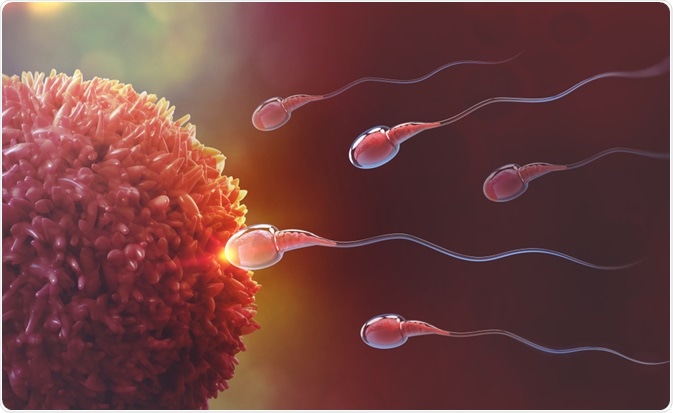Male Age and Fertility

As career ambitions increasingly drive modern couples, many are delaying having children until later in life, at which time men are more likely to experience infertility.
Male Age and Fertility
Although it is well-established that women are most fertile before 40 years old, little is known about the critical threshold of sperm production in men, who can continue to conceive children beyond their 40s.

Image Credit:Yurchanka Siarhei/Shutterstock.com
Due to this lack of knowledge and the increase in parental age, research continues to be conducted examining the effects of age on male fertility.
A meta-analysis of 90 studies examining the effect of age on male fertility found an age-related decrease in the overall volume of semen, the total number of sperm, typical sperm morphology, and sperm motility in addition to an increase in the fragmentation of DNA. Furthermore, although there was a decrease over time, the concentration of sperm within the sample was not found to decrease in relation to increasing male age.
Following an analysis of the semen parameters in healthy men aged between 22 and 80 years old, it was shown that the motility of sperm and the volume of semen gradually reduced over time, but without a specific age threshold.
However, similar research involving the retrospective analysis of semen parameters in 5081 males aged between 16.5 and 72.3 found the following:
- The number of motile sperm and overall sperm count declined after 34 years old;
- The number of sperm with typical morphology and concentration decreased after 40 years old;
- Sperm motility decreased after 43 years old;
- The volume of ejaculate produced decreased after 45 years old;
- The proportion of Y:X – bearing sperm decreased in the ejaculate after 55 years old.
Based on this, the researchers of the study noted that irrespective of the woman's age, the chance of conceiving reduces in men over the age of 34.
The underlying mechanisms of the age-related decrease in male fertility are not currently well known. It is hypothesized that such changes may be due to the increased risk of damage to the reproductive system resulting from infections or smoking due to age, reduced tissue and cellular repair of damage due to toxin or disease exposure, or due to the normal changes that occur within the reproductive system as individuals age.
Male Reproductive System and Age
As men age, their testes are subject to age-related structural changes such as the narrowing of the seminiferous tubules, alongside morphological changes, including a reduction in the number of Sertoli, Leydig, and germs cells.
Additionally, the levels of total and free testosterone, the primary male sex hormone, decreases in line with age increasing in the dysfunctional activity of the testes.
Hypothalamus-pituitary-gonadal regulation is also subject to change as men age. Additionally, reactive oxygen species begin to accumulate in the male germ cell throughout aging, leading to damage to the sperm DNA and oxidative stress.
Male Infertility
Most male infertility is associated with poor-quality semen, which can be caused by a variety of reason such as: having abnormally shaped sperm, having sperm that do not move correctly, and having a low sperm count.
Several other factors are attributed to male infertility. If a couple is trying to get pregnant, being aware of the following factors and making changes were appropriate may improve the chances of conceiving.
Recreation Drugs
Specific recreational drugs have been found to reduce the quality of sperm and consequentially reduce fertility. If trying to get pregnant, males should avoid taking the following drugs:
- Anabolic steroids
- Amphetamines
- Cannabis
- Types of opiates including methadone and heroin
- Cocaine
Smoking
Smoking can have both a negative effect on the ability to conceive and on a newborn baby's health.
Smoking while trying to conceive can reduce fertility, and exposing a newborn baby to cigarette smoke is associated with an increased risk of sudden infant death syndrome and respiratory disease.
Sperm Temperature
The temperature of the testicles can also affect fertility. The testicles are located outside the body because they need to be around 34.5 °C compared to the rest of the body's optimum temperature of 37 °C to produce the best quality sperm.
For those working in an occupation that requires extended periods of sitting, it is important to try and move around as regularly as possible. Similarly, those working in hot environments can reduce the temperature of their testicles by moving outside to colder environments regularly.
Tight-fitting clothes can also increase the temperature of the testicles by 1 °C. Therefore, although the effects may be marginal, wearing looser fitting underwear may increase fertility for those wanting to conceive.
Sources
- NHS (2017). How can I improve my chances of becoming a dad? www.nhs.uk/…/
- NHS (2017). Infertility: Causes. https://www.nhs.uk/conditions/infertility/causes/
- Hassan, M. A. M., & Killick, S. R. (2003). Effect of male age on fertility: evidence for the decline in male fertility with increasing age. Fertility and Sterility. DOI:10.1016/S0015-0282(03)00366-2
- Durairajanayagram, D. (2018). Lifestyle causes of male infertility. Arab Journal of Urology. Doi: 10.1016/j.aju.2017.12.004
Further Reading
- All Fertility Content
- Fertility and Age
Last Updated: Apr 10, 2020
Source: Read Full Article




